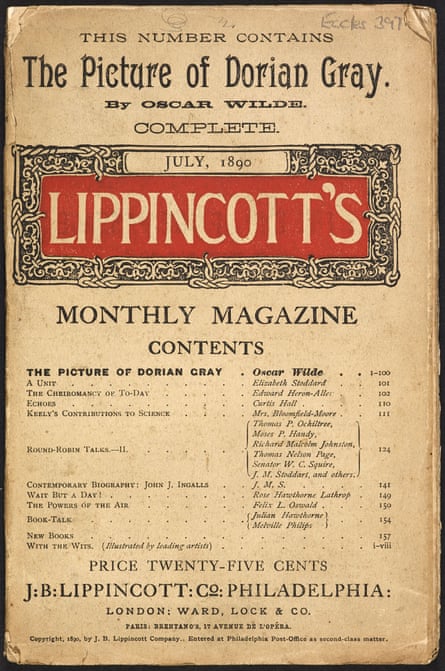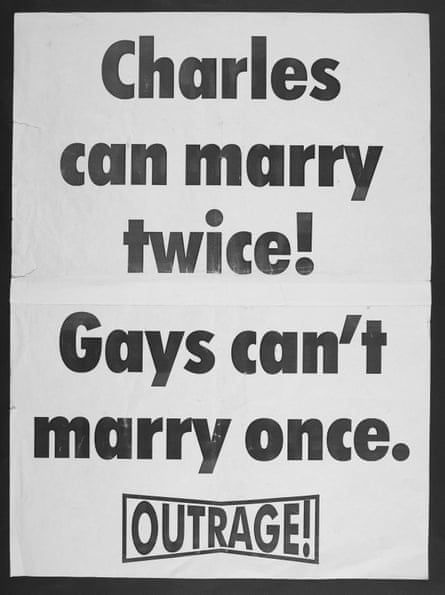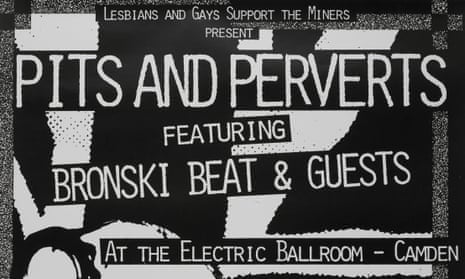The history of gay culture in the UK, from its repression to its celebration in the past 100 years, is to be displayed for the first time in an exhibition at the British Library, which marks the 50th anniversary of the decriminalisation of homosexuality.
Original literary manuscripts and rare prints of newspapers and novels are to go on show at the London venue to mark the “transformation in society’s attitudes towards gay love and expression”, curators at the library said.
Featuring artefacts ranging from the issue of Lippincott’s magazine that included the first publication of Oscar Wilde’s Picture of Dorian Gray, to the issue of Hello! displaying the family of Elton John and David Furnish on the cover, the exhibition Gay UK: Love, Law and Liberty depicts a nation’s evolving attitudes towards homosexuality.

Among the items on show is a memo from the lord chamberlain’s office in October 1958, proposing marginally greater freedom for gay playwrights. “For some time the subject of homosexuality has been so widely debated, written about and talked about, that it is no longer justifiable to continue the strict exclusion of this subject from the stage,” the memo says. “I therefore propose to allow plays which make a serious and sincere attempt to deal with the subject.”
Other works on display are a manifesto from the Gay Liberation Front, notebooks and journals from writers including Sarah Waters, Kenneth Williams and WH Auden, a never-before-seen annotated script by Hanif Kureishi for the Oscar-nominated film My Beautiful Laundrette, and the first edition of Virginia Woolf’s Orlando, as well as a new commissioned film by the performer and artist Dickie Beau.
“Gay UK: Love, Law and Liberty tells [the story of society’s transformation] through objects and documents that are iconic, public, personal or seemingly ephemeral,” said Rachel Foss, lead curator of the exhibition. “These objects and documents are the tangible evidence of a living history that is fragmented, punctuated by gaps and still evolving. I hope that the exhibition will prompt visitors to consider not only how far we as a society have come but also, crucially, what still needs to be done to combat prejudice and realise true equality.”
The exhibition also shines a light on how music in the 80s began to give gay people more public representation. A few years after David Bowie performed Starman on Top of the Pops and altered the world of pop music, acts including Bronski Beat, who became the first openly gay band in the UK, as well as Soft Cell and Culture Club made it into the charts.

“This exhibition gets a message across more than a label could,” said Steven Dryden, another of the exhibition’s curators. “There is a history here for visitors to discover. I hope the takeaway is that knowledge is power.”
The British Library will be hosting an accompanying season of events that includes talks by Jon Savage and Juno Dawson as well as poetry readings.
In a statement, the gay rights campaigner Peter Tatchell expressed a reminder that while the liberalisation of 1967 was progress it was not as liberal as many people believed, and gay sex remained prosecutable in many circumstances.
“Full legal reform did not happen until 36 years after 1967,” Tatchell said. “The gross indecency law of 1885 had been used to convict the computer genius Alan Turing in 1952 and, before him, to jail the playwright Oscar Wilde in 1895. Together with the criminalisation of anal sex, it was finally repealed by the Sexual Offences Act 2003. As a result, for the first time in 470 years England and Wales had a criminal code that did not penalise gay sexuality.
“In Northern Ireland, the ban on anal sex was finally repealed in 2008. Scotland’s anti-gay laws were abolished in 2009 but, in the case of sodomy, did not take effect until 2013. Gay sex ceased to be a crime in the UK only four years ago. Unbelievable but true.”
